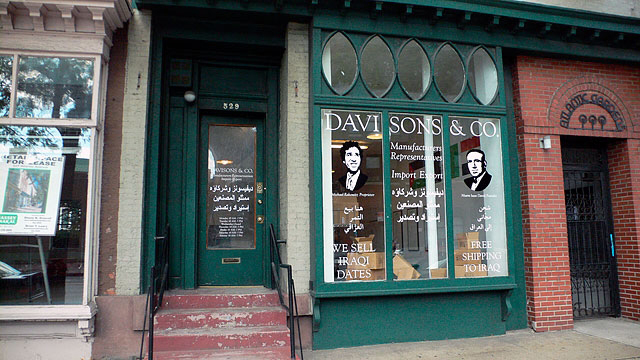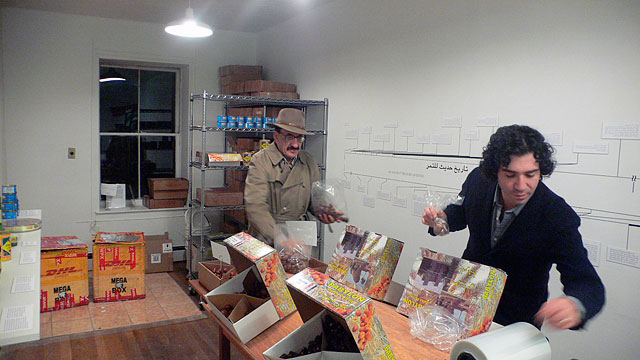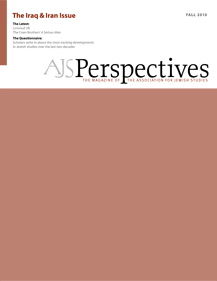

A longtime symbol of good things to come in the Muslim and Jewish faiths, dates have an extensive social and economic history in Iraq. Besides being an important cultural signifier, in the 1970s dates were Iraq's largest export after oil. They are also tied directly to the fruit's production in the United States: when the California industry began in the early 1900s, Iraqi seeds were planted. In Iraq, however, dates have been a casualty of recent conflicts. Orchards were dramatically affected in the 1980s by the Iran-Iraq War, and in recent years the trees have suffered from a fungus caused by depleted uranium from bombshells.
In order to explore this issue further, Rakowitz decided to import one ton of Khestawi dates from the Iraqi city of Al Hilla, formerly Babel, and sell them at a storefront on Atlantic Avenue in Brooklyn, the heart of New York's Arab community. Continuing a project that he initiated in 2004 entitled Return, Rakowitz reinstated Davisons & Co., his Iraqi-Jewish grandfather's import-export business that existed first in Baghdad and later in New York City when his family fled Iraq in 1946. With funding from Creative Time, a nonprofit organization that commissions and produces public art projects, Return was scheduled to open on October 1, 2006 and close two months later. Perfectly timed with the harvest that would begin at the end of September, Rakowitz submitted the official order on September 7th through Sahadi's Specialty and Fine Foods and the Baghdad-based Al Farez Co. Before the store opened, Rakowitz received his first order from a man in Detroit who read his advertisement in an Arab-American newspaper in Dearborn, Michigan—the home of the largest Iraqi population in the U.S. As a way of keeping his customers and the general public updated, Rakowitz wrote a daily blog on his website and signed people up for a listserv. Knowing that the shipment would produce charges beyond the initial price, Rakowitz would sell the dates at a cost that would reflect the fees incurred through the process.
Dates were the centerpiece of Return and were visible throughout the store—as California varietals that originated in Iraqi seeds, items on the shelves such as ma'amoul cookies, and in their own historical timeline researched by Rakowitz. But it was Iraqi dates that were at issue, a fact that was prominently announced by a sign in the window: "We Sell Iraqi Dates." Hoping to create a space for people to engage with larger issues that surrounded his proposal, the artist explained, "if the dates were available and were relatively easy to import, there would be no reason to build a project around their purchase. Ultimately, the cultural invisibility in the U.S. of all things Iraqi outside the context of war (i.e., there are no Iraqi restaurants in New York City) served as a point of departure for this work."
Soon after the store "opened for business," a small community formed in anticipation of the first shipment of Iraqi dates. It was scheduled to arrive in mid-October, but it never did. The dates were denied passage at the Jordanian border after sitting for days alongside Iraqis fleeing the intensifying situation. The shipment was then driven to Syria and finally spoiled after additional delays at the Damascus airport. A few weeks earlier, Rakowitz's contact at Al Farez in Baghdad had himself fled to Amman, Jordan with his family. This was an important realization for the artist as his contact was now an exile trying to transport dates overseas to other members of the Iraqi diaspora. Rakowitz explained, "The dates suddenly became a surrogate, traveling the same path as Iraqi refugees. . . . So, suddenly, a business that was meant to illuminate something very specific on the U.S. side of the transaction was illustrating a story that most people in the States were not hearing, and the store became a place where that crisis and its affiliated narrative were being disseminated—hardly the exchange a customer would expect."
A second plan for a shipment of dates finally was successful. It involved the airlift of a handful of boxes out of Baghdad and their shipment via DHL first to an airport in Egypt and then on to New York. This time, the dates remained unscathed; but the route was once again circuitous, including a delay of twentyone days due to U.S. Customs, Homeland Security, USFDA, and USDA. Quarantined and designated for intensive search, the shipment was picked up by Rakowitz on December 5. With reporters waiting, Rakowitz brought the dates to his store in boxes designed by Al Farez Co. that declared their identity and history through images that included the lion of Babylon and the Ishtar gate. To the best of Rakowitz's knowledge, these were the first Iraqi products clearly labeled as such that had been legally imported into the United States in almost thirty years.
In the end Rakowitz received ten boxes of dates including four varietals: Azraq, Ashrase, Ibraheme, and Kheyara. The final cost to his customers was $8 a quarter pound. Reporters from The New York Times, CBS, and NPR's Weekend America covered Return; CBS Evening News and Comedy Central's Colbert Report expressed interest. The dates were purchased by a wide range of customers with varying motivations: among them was a Muslim attending Ramadan prayers at a local mosque, an American who wanted to send the dates to a friend stationed in Baghdad who had never eaten Iraqi food, a woman who was interested in importing honey from Kurdistan, and an Iraqi exile who had not eaten a date from his homeland in forty-six years. In the eleven weeks that Davisons & Co. was open in Brooklyn there were many changes in Iraq: Saddam Hussein was sentenced to death, and Donald Rumsfield resigned as Secretary of Defense. The project had impacted Americans and Iraqis on both sides, providing a new understanding of cultural trade and relations. After the project commenced Rakowitz reflected, "Getting these Iraqi dates was so much about authenticity. Creating a suture, or prosthetic, that could be created for those who can never go back, or for those who will never go but have this irrevocable relationship to Iraq now, just as Americans." Return proved that international communities can form and unite over something as seemingly small as a piece of fruit.

